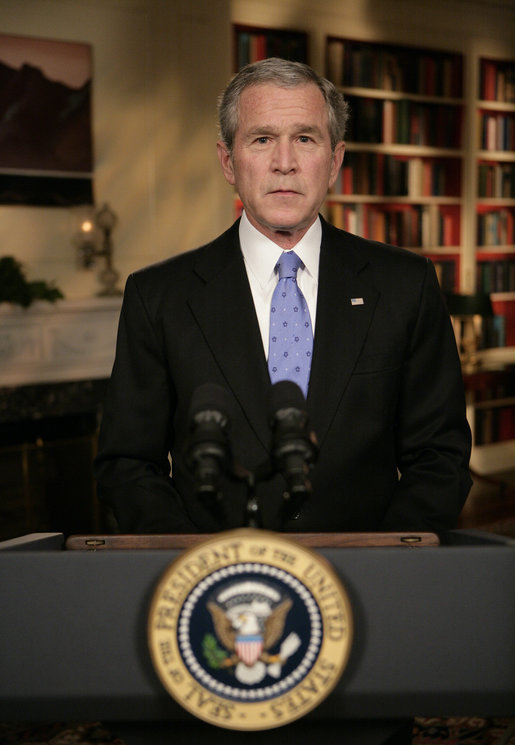“‘This is what happens any time anyone tries to question a statement or a position of Senator Obama,’ Clinton says in an interview now airing on Sirius satellite radio. “The response is, ‘You’re attacking me personally,’ and that relieves him of the obligation to address the substance.” Bill Clinton spins himself deeper. When has Sen. Obama said anything of the sort? The closest I could find was this, from Dec. 21, after several weeks of Sen. Clinton’s “Now comes the fun part” attack strategy: “‘So far, I think, attempts to go negative in a way that’s not policy-based have backfired on the people who have gone in that direction,’ Obama said during a brief interview…’I would distinguish between ads that I would say maybe mischaracterize my positions but had to do with policy, versus personal attacks or attempts to go at my character or those things. In which case, I will answer them swiftly and truthfully if they’re false and trust in the voters.’” So Obama hasn’t said anything of the kind. Clinton instead appears to be projecting his own tried-and-tested strategy upon the Senator from Illinois.
President Clinton’s clarifying of his sad “fairy tale” moment is as follows: “Clinton told Sharpton the ‘fairy tale’ remark was only intended to describe Obama’s claim to have exercised better judgment about the war, and was not intended as a sign of ‘personal disrespect.’” Clinton has then continued to press this “flip-flopper on Iraq” attack: “And in fifteen debates, no one ever once bothered to ask Senator Obama, ‘How can you say you were always against the war, and your judgment is better than theirs, and they were wrong to vote for that resolution which authorized force, when two years after you gave the anti-war speech in 2004, you, Senator Obama said you didn’t know how you would have voted on that anti-war resolution, number one, then two days later, you said there was no difference between you and President Bush on the war?’”
For what it’s worth, Tim Grieve posted on this on “fairy tale” day, as did I, and an exhausted-seeming Obama responded to ABC then too. (Note, in Obama’s response to Clinton, that he says nothing akin to what Clinton is claiming about personal attacks.) So I’m repeating myself now, but then again so are the Clintons.
As Americans can remember all too well, former President Clinton has a practiced affinity for the lawyerly half-truth. (“That depends on what your definition of the word “is” is,” ad absurdum.) With regard to this continued smear, the key word is “debates.” This exact question may not have come up during a Democratic debate, sure. But it was one of the centerpieces of Obama’s appearance on Meet the Press on November 11 — see page 2 of the transcript — and it’s been asked and answered. (See also this incomplete clip of CNN’s Candy Crowley covering the same ground with Obama.) Worse, Clinton keeps leaving out the parts of Obama’s quotes that prove his charges are baseless. I’ve reposted Grieve’s summation below:
“Yes, Obama said in 2004 [at the Democratic convention, as we were nominating two war-voting Senators] that he did not know how he would have voted on the war if he’d been in the Senate at the time. But he suggested in the same interview that his uncertainty stemmed from the fact that he wasn’t ‘privy to the Senate intelligence reports” that sitting senators saw,’ and he added: ‘What I know is that, from my vantage point, the case was not made.‘” [My emphasis.]
“Did Obama really say in 2004 that there was ‘no difference’ between his views and George W. Bush’s on the war? Not exactly. As the Washington Post has explained previously, what Obama actually said in the interview to which Clinton was referring was that while he would have voted against the resolution authorizing the use of force in Iraq, he was not in favor of ‘pulling out now.’ Thus, when Obama said that there’s ‘not much of a difference between my position and George Bush’s position at this stage,’ he was plainly referring to the question of whether to stay in Iraq, not the decision to invade in the first place.“
Clinton kept repeating this “fairy-tale” accusation in his string of so-called apologies today, but he has yet to give the full story about Obama’s remarks. He’s contrived a negative attack out of a deceptive half-truth, and he’s clearly just trying to confuse people. When it comes to the substance of Clinton’s smear, there’s no there there.
In short, President Clinton is obfuscating here about Senator Obama’s view of the war. Use a stronger word if you’d like.
Update: “‘I’m really troubled by his questioning the sincerity of Barack Obama’s opposition to the war in Iraq,’ Durbin said. ‘I really think it is unfortunate to question Barack’s sincerity on the war. He has been there from the start, opposing this war.’” Obama supporter Sen. Richard Durbin responds — and responds hard. I love this: “If President Clinton had opposed that war as strongly as Barack Obama at the time, it would have helped a lot of us who had voted against authorizing an invasion.” Touche.




